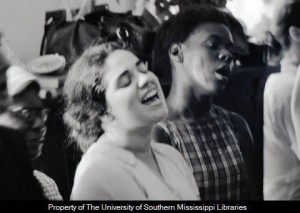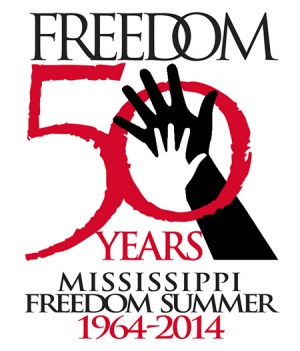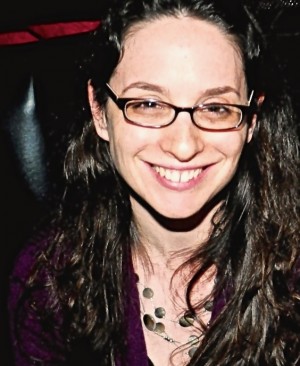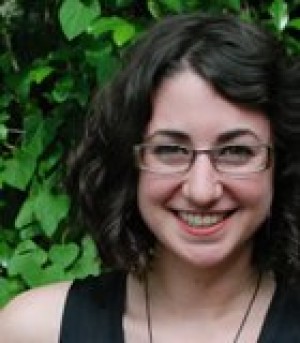Interfaith, In Good Faith

University of Southern Mississippi Libraries
Barbara Schwartzbaum and others singing during Freedom Summer in Hattiesburg, Mississippi, 1964.
This article is part of a Zeek series published in honor of the 50-year anniversary of Freedom Summer and those who continue the fight today for justice.
Sitting in pews, swaying slightly to the music, the sticky temperature rising right along with the voices, a young Jewish woman opens her mouth to pray. The words she sings are not the Sh’ma, but feel as sacred, unified, and declarative:
“We shall overcome, we shall overcome, we shall overcome someday…”
The pews are not synagogue pews, but church pews. The young woman is me, a decade ago at Mt. Zion Missionary Baptist Church in Philadelphia, Mississippi, at the annual memorial service for James Chaney, Andrew Goodman, and Michael Schwerner, three civil rights workers — killed in Mississippi while working to register black voters in 1964. One of these men was African American; two were Jewish.
Each year, an assembly of black and white faces, Christians and Jews, soldiers in the same battle for justice gather to mourn. Sitting in those pews near the site where the three were killed, I feel a connection to the Jewish civil rights workers of 1964. I feel the heat they felt in the crowded sanctuary, which still lacks air conditioning. I wonder if I would have had their courage.
This year, the memorial is part of something bigger, leading up to Mississippi Freedom Summer 50. The Mississippi Freedom Summer 50 event will bring today’s activists together to reflect on the hard-won achievements of the past 50 years, and to strengthen the civil rights movement for the work ahead.
Two transplants to Mississippi, Rachel Jarman Myers and Malkie Schwartz of the Goldring/Woldenberg Institute of Southern Jewish Life are spearheading a Jewish activists’ summit in conjunction with Mississippi Freedom Summer 50. They hope to build on the legacy of interfaith social justice work.
“There are still so many issues of civil rights here that need defending and advancing,” says Malkie Schwartz, a New York native and former executive director of Footsteps. She moved to Mississippi in 2009 to become the ISJL’s first director of community engagement.
“Mississippi is still the poorest state in the nation, and we have a 35% child poverty rate. We’re grappling with issues of economic and social justice: poverty, health disparity, discrimination, education.” Committed to community engagement and social justice, she says she wants to “create opportunities for other Jewish activists to be involved with this milestone, and to stay involved.”
It’s an auspicious time for the civil rights movement: fifty years since Freedom Summer and one year since key sections of the Voting Rights Act were struck down, allowing election laws to be changed without federal approval. Voters in Mississippi must once again show ID to vote. For many young Jews today, just as it was in 1964, involvement in social justice serves as a connection point to Judaism.
“The legacy of Jewish activists who came South really resonates with me,” says Rachel Myers, a Connecticut native who came to work for the ISJL in 2008, after graduating from Brandeis University.
“It takes some time to build trust … as an outsider. There was that suspicion when I first got here: ‘What’s that white Jewish Yankee doing here? What’s her motivation?’ But you build relationships, and that eases the suspicion.”
“I’d call it a healthy skepticism,” adds Schwartz. “The African-American community has good reason, historically, to be wary of those who ‘wanted to help.’ But by showing up, listening, and doing the work, you connect.”
The dynamics around race tend to be more divisive than around religion in this arena, despite the overwhelmingly Christian identity locked into the buckle of the Bible Belt.
When it comes to interfaith organizing, says Max Socol, a Jewish educator and the founder of Carolina Jews for Justice, “there are mundane logistics, like scheduling events on weekends, when every day is someone’s Sabbath. Or trying to respectfully coach Christian clergy, who are accustomed to more homogeneous audiences, on how to avoid unnecessarily sectarian language when praying on behalf of the group.”
Planning for the 50th anniversary has presented challenges, including looking beyond racial diversity to ensure more broad-based inclusivity: gender, age, race, religion, physical ability. Making sure everyone is welcomed and represented is all the more critical since some outsiders still see the South as backward.
“It’s important for us to be part of the work, while recognizing our privilege,” Myers says. “Yes, Jews experienced discrimination, but because Jewish immigrants were [mostly] white, they could prosper here; we can’t compare the Jewish experience in the South to the black experience in the South. We thought a lot about that when planning.”
Civil rights icon Bob Moses once put it this way: “In Mississippi, the voiceless found their voice, and once raised, it could not be ignored.” His words remind us to be careful while advocating for others, careful to listen more and speak less.
When the Israelites are asked in Exodus if they will take on the responsibilities of the Ten Commandments, they say: “Na’aseh v’nishma! We will do, and we will hear/listen!” But in social justice work, a better policy sometimes is “Nishma v’na’aseh… We will listen/hear, and we will do.”
In that spirit, Freedom Summer sessions focus on the model of learn, then do. With sessions protecting voting rights, raising the minimum wage, diversifying the movement, the aim is to educate, then find ways to engage in actions that have an ongoing impact. One example: “Call to Action,” an interactive session led by Elana Kogan, national field director for Bend the Arc: A Jewish Partnership for Justice, and Etta King, education program manager at the Jewish Women’s Archive.
The call to action seems intuitive to many. Asking why Jews should be involved in civil rights today, says Max Socol, is like asking why Jews need to take an interest in being human: “If Judaism is not concerned first and foremost with social justice and civil rights, then why should I take an interest in Jewish community today?”
It is that commitment to social justice, intertwined with Jewish identity and values, that drew young activists 50 years ago and draws us still today. At the inclusive Shabbat, ecumenical Sunday, and memorial services, activists will again sit together in pews, united by their commitment to civil rights.
“We know it will be a majority Christian presence. That’s what Jewish volunteers in the ’60s experienced, too,” says Myers. “Churches were the gathering space. I think the people coming down are excited about that. There’s something inspiring about the spiritual togetherness you find in the African-American church setting.”
“And the singing,” Schwartz adds.
The still-echoing refrain, a diverse chorus of voices lifting once again in a Mississippi summer: We shall overcome… someday.
What Can You Do?
Be a part of Freedom Summer 50 in Mississippi! If you can’t, check out the work of these phenomenal leaders and scholars coming here and get involved in their civil rights, right where you are.
Get involved with a local social justice organization, whether it’s a Jewish one like Carolina Jews for Social Justice or a community-based one like the ACLU. If there isn’t one near you, learn how to start your own!
Build your resource toolkit and learn more about contemporary and historic civil rights work through the dynamic content available from Zeek, Jewish Women’s Archive, Bend the Arc, and the Jewish Social Justice Roundtable.
Listen, then do. Becoming an insider takes time, and being a good listener is a powerful tool of an effective ally, and ultimately an effective activist. Nishma v’na’aseh: We will listen, and we will do.
Beth Kander is a writer who divides her time between Chicago, Illinois, where she and her native-Louisianan husband are already laying in supplies for winter; and Jackson, Mississippi, where she coordinates communications and development for the Goldring/Woldenberg Institute of Southern Jewish Life.
![[the current issue of ZEEK]](../../image/2/100/0/5/uploads/leftistethicistgraphic-52842c6a.png)
- 5000 Pages of Zeek
- Founded in 2001, Zeek was the first Jewish online magazine, and we have over 5000 pages online to prove it, all available free of charge. Read more in the Archive.
More articles in




